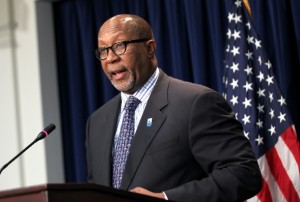

Follow us on:  
|


Ron Kirk, US Trade Representative. [Getty Images]
Ron Kirk, US Trade Representative (USTR) recently charged that India’s programme gave an unfair advantage to local manufacturers by pushing the use of locally manufactured cells and by offering subsidies to those developers who use domestic equipment.
“The US strongly supports the rapid deployment of solar energy around the world, including with India,” Kirk said in a statement on Wednesday.
“Unfortunately, India’s discriminatory policies in its national solar programme detract from that successful cooperation, raise the cost of clean energy, and undermine progress towards our shared objective.”
But in an interview with The Wall Street Journal, Tarun Kapoor, joint secretary at the Ministry of New & Renewable Energy, admitted that New Delhi did require that some projects get equipment from local vendors in accordance with a 2010 national policy, but that this was only for “specific items.”
He said that India hasn’t stopped imports of equipment and continues to comply with WTO rules.
A divide between developed and developing nations has been slowly growing among WTO members, with the latest disagreement arising between India and richer nations over IT and environmental goods pacts.
With negotiations at the Doha Round of talks stalled for over a decade, a group of developed countries have taken a detour and are urging India, among other developing countries, to accept four major sectoral pacts – trade facilitation (TF), information technology (IT), environmental goods and international services agreement.
In 2011, India filed a complaint with the WTO after complaining of unfair US duties on its steel products.
The next year, Washington failed a complained against India’s ban of US poultry.
Source: Agencies